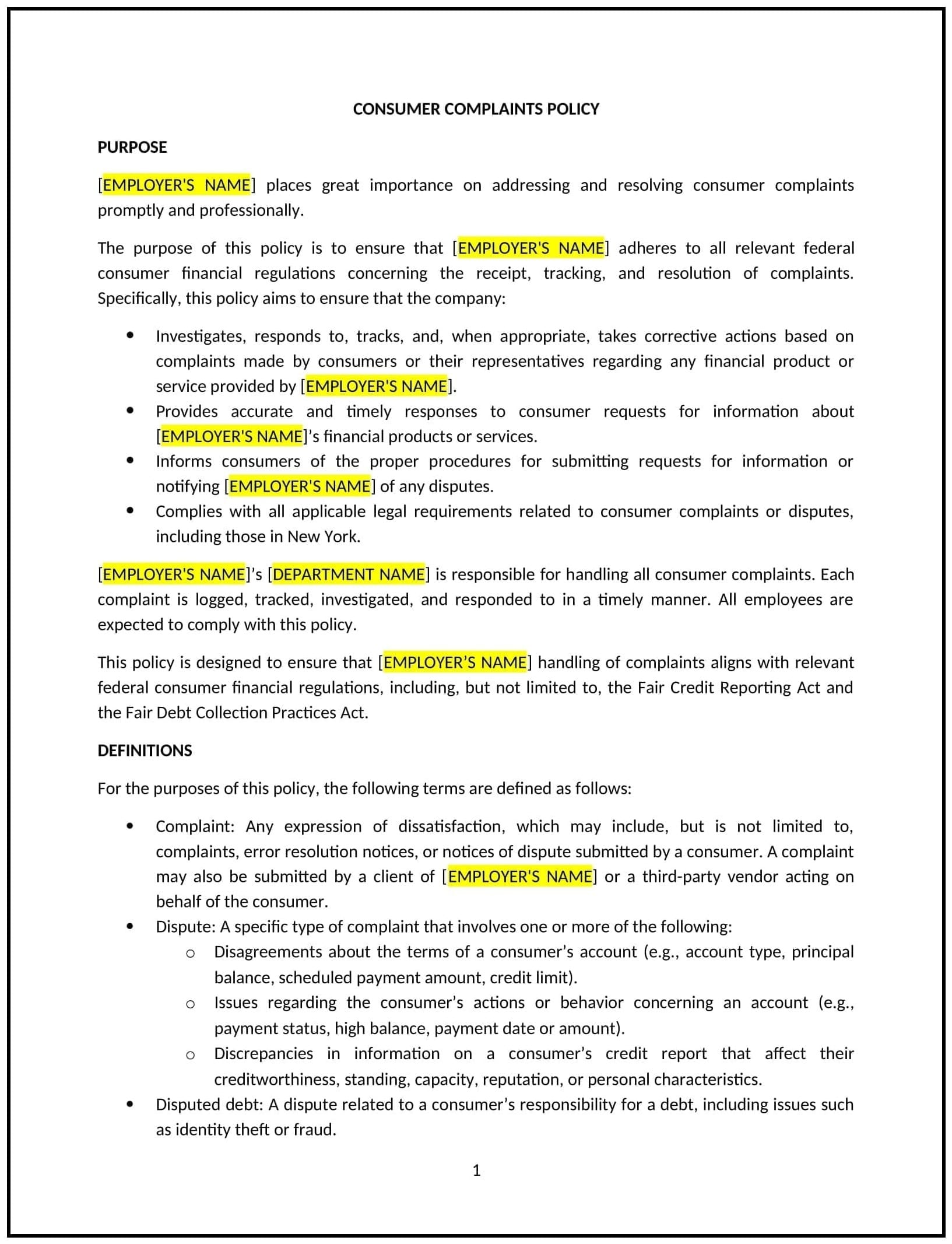Consumer complaints policy (New York): Free template
Got contracts to review? While you're here for policies, let Cobrief make contract review effortless—start your free review now.

Customize this template for free
Consumer complaints policy (New York)
A consumer complaints policy helps New York businesses manage and respond to customer complaints effectively, ensuring that consumers have a clear, structured process for raising issues. This policy outlines the steps for receiving, investigating, and resolving complaints, while also providing guidelines for how businesses should address issues related to product defects, customer service, and other concerns. The policy also establishes timeframes for responding to complaints and ensures that consumer rights are respected, in line with New York state consumer protection laws.
By implementing this policy, businesses can enhance customer satisfaction, improve their products or services, and reduce the risk of legal disputes or damage to their reputation.
How to use this consumer complaints policy (New York)
- Define the scope of complaints: Clearly define what constitutes a consumer complaint, including issues related to products, services, customer service, or other areas of concern. The policy should specify the types of complaints that will be addressed under this policy.
- Establish reporting mechanisms: Provide consumers with clear instructions on how to submit complaints, including the contact information for customer service or a designated complaint resolution team. The policy should also specify any forms or documentation needed for filing a complaint.
- Set response timeframes: Outline the timeframe within which businesses will acknowledge receipt of the complaint and provide a resolution. The policy should specify how quickly complaints will be addressed and resolved, based on the severity or complexity of the issue.
- Investigate complaints thoroughly: Define the process for investigating complaints, including the steps to be taken, the roles of the individuals involved, and the documentation needed. The policy should ensure that complaints are handled impartially and thoroughly.
- Resolve complaints effectively: Specify the possible outcomes of a complaint investigation, including refunds, replacements, apologies, or corrective actions. The policy should ensure that resolutions are fair and aligned with business practices.
- Protect consumer rights: Ensure that the policy is aligned with New York state consumer protection laws, such as the New York General Business Law and any relevant federal regulations, to safeguard consumer rights and ensure compliance.
- Maintain documentation: Keep records of all complaints, investigations, and resolutions for future reference. This documentation can be useful for identifying patterns and improving business practices.
Benefits of using this consumer complaints policy (New York)
This policy offers several benefits for New York businesses:
- Enhances customer satisfaction: The policy helps businesses address consumer concerns promptly and effectively, improving customer trust and satisfaction.
- Reduces legal risks: By handling complaints in a structured and compliant manner, businesses can mitigate the risk of legal disputes, fines, or penalties related to consumer rights violations.
- Improves products and services: Complaints can provide valuable feedback that helps businesses identify areas for improvement, ensuring continuous enhancement of products and services.
- Builds a positive reputation: A clear and effective complaint resolution process demonstrates that a business values consumer feedback and strives to provide excellent customer service, enhancing its reputation in the market.
- Increases consumer trust: Consumers are more likely to trust businesses that have transparent, fair processes for handling complaints. This trust can lead to increased loyalty and repeat business.
Tips for using this consumer complaints policy (New York)
- Communicate the policy clearly: Ensure that all consumers are aware of the complaint process and how to file a complaint. The policy should be easily accessible, such as on the business's website or included in product packaging or service agreements.
- Act promptly: Acknowledge receipt of complaints as quickly as possible and respond within the specified timeframes. Prompt action can prevent issues from escalating and helps demonstrate the business's commitment to customer service.
- Train staff: Provide training to employees on how to handle consumer complaints professionally and empathetically. Staff should be aware of the procedures for escalating complaints and the importance of resolving issues efficiently.
- Keep detailed records: Maintain comprehensive records of all complaints, investigations, and outcomes. This documentation can help identify trends, improve business practices, and ensure that complaints are handled consistently.
- Monitor and review the policy regularly: Periodically review the consumer complaints policy to ensure it remains relevant and effective. This includes ensuring compliance with any updates to New York state or federal consumer protection laws.